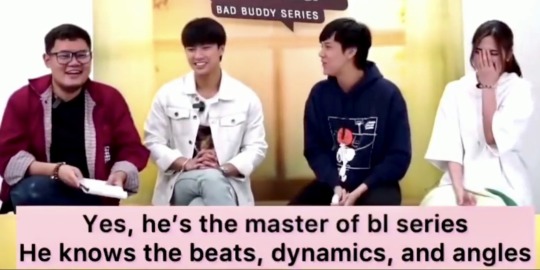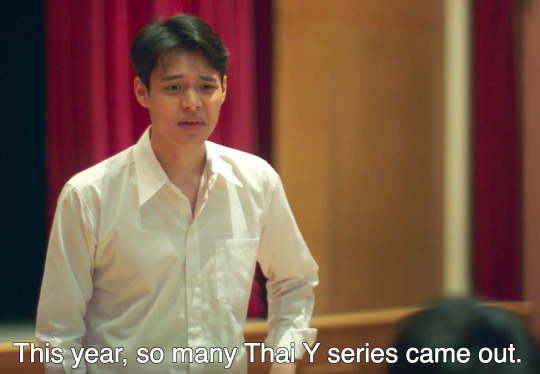#internet discourse is a minefiled
Note
Hi!
I have seen calls by Western (mostly American judging by English accents) fans to stop using the words Tsundere and Seme or other non-English labels related to BL. Critics have stated this alongside requests to stop using terms “top” and “bottom” as they are antiquated and limiting in their use, stuck in a gender binary and the roles that come with it, and hetero-centric.
As a queer, white, American BL fan, I am hesitant to comment on any part of queer culture that isn’t mine. I don’t particularly use the words mentioned but that has more to do with being new here and not remembering them than it does any conscious boycott. I also am hesitant to criticize queerness and how it it is expressed in culture outside of my own. For example, the use of the term “wife” in Thai BL to refer to a male partner. I don’t really know about Thai queer culture so I don’t have enough info to comment.
Anywho, I’m curious what your thoughts are on the Western, queer lens and critique of BL? It seems short sighted to me in my minimal exposure. I’d love your thoughts.
Love your blog! Keep up the awesome work.
seme/uke isn't queer (sorry, but its not terminology that belongs to, applies, or even should really be used by the queers to apply to our community in any way, certainly not applied to other queers *shudder*) its narrative terminology, as in pop culture or lit crit. Which means, by its nature, it is designed to talk about characters and archetypes, not real humans. Avoid applying it to real people and it's fair game IMHO. The problem is fans conflating it (or BL characters, for that matter) to real human beings. And that's fandom's fault, not the syntax.

I really don't like the pillarization of words, (and I can’t STAND attacks within the community, like seriously don’t queers have actual - ya know - rights for fight for and non-queers to police these days, why all this infighting?) especially when there is NO alternative narrative word choice that doesn't impose a queer lens onto stories (BL or yaoi). These narratives are still, in the main, NOT queer, and not intended for a queer audience. In other words, can a critic of the terms seme/uke come up with something better than seme/uke? Until they do, I think it’s fair to apply these words to narrative analysis and discussion as long as the user defines them and knows their history.

Western queer lens critique/approach is fine IMHO so long as the critic understands their lens, bias, and cultural immersion issues (as in, limits to comprehension and socio-political, linguistic, and regional bubbles). Or makes an honest attempt.
The point of healthy dialogue around pop culture is to encourage research, linguistic and otherwise, and understanding, travel (actual, mental, emotional, or fantastical), immersion, and openness to alternate cultures, social dynamics, and ways of perceiving the world. (And I do mean perception.) So long as all that is occurring because of these narratives, then the narratives are doing their pop-culture jobs.

With the possible exception of Japan, BLs are being expressly produced for a global market (now) therefore they not only can be but should be critiqued (in the academic sense of the world) by global audiences based in different cultures (and with different lenses).
BL is pop culture entertainment intended for a global market (as, indeed, is Kpop). It’s like publishing a book and not expecting bad reviews. The thing has gone out into the world to entertain, and entertainment by its nature it is what the audience makes of the experience. The resulting pop culture phenomena IS a dialogue between creator/artist and consumer/audience. Otherwise why put it out into the world in the first place?

This goes into one of those old arguments about separating the art from the artist. Does the art itself have its own autonomy? Will harry potter always be colored by JKR’s behavior? Ender’s game by Card’s? Lovecraft by Lovecraft’s?
I am one those critics who believe that the experience of art and entertainment is what the audience makes of it, but that the origin should be taken into account as well. These aren’t mutually exclusive. The nature of intent is in play in both directions. The creator may intend one thing, but the consumer can and will end up reacting to whatever they make of that creation. They will take away what they wish from the experience. They will bring their own bias and life experiences to their enjoyment of any piece of media. Which is why no media satisfies everyone.
In other words, the creators of the thing and what they intend is in play, but so is the intention of the audience. Some viewers go into BL with the intent to find flaws and to criticize (in the online sense of the word) and many of those are queer folk.
Also, negativity always gets more online attention than positivity.
I guess all this is say sure “everyone is entitled to their own opinion,” but if certain persons feel entitled to express that option in public, I’m equally entitled not to give it any weight if it’s ill informed.
QED
#I don't know I think I lost the thread somewhere#internet discourse is a minefiled#grumbles in seme/uke
63 notes
·
View notes